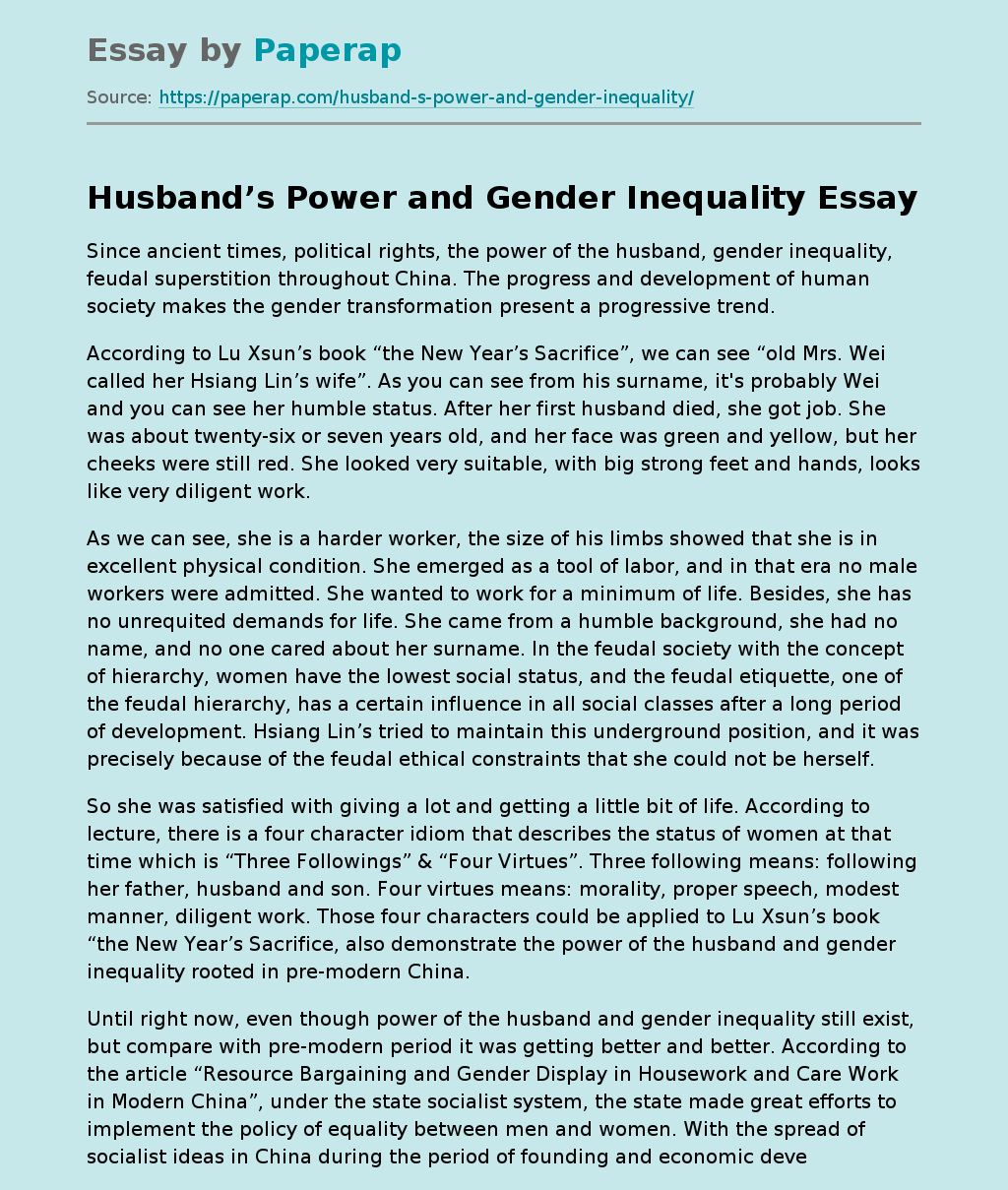Since ancient times, political rights, the power of the husband, gender inequality, feudal superstition throughout China. The progress and development of human society makes the gender transformation present a progressive trend.
According to Lu Xsun’s book “the New Year’s Sacrifice”, we can see “old Mrs. Wei called her Hsiang Lin’s wife”. As you can see from his surname, it’s probably Wei and you can see her humble status. After her first husband died, she got job. She was about twenty-six or seven years old, and her face was green and yellow, but her cheeks were still red.
She looked very suitable, with big strong feet and hands, looks like very diligent work.
As we can see, she is a harder worker, the size of his limbs showed that she is in excellent physical condition. She emerged as a tool of labor, and in that era no male workers were admitted. She wanted to work for a minimum of life.
Besides, she has no unrequited demands for life. She came from a humble background, she had no name, and no one cared about her surname. In the feudal society with the concept of hierarchy, women have the lowest social status, and the feudal etiquette, one of the feudal hierarchy, has a certain influence in all social classes after a long period of development. Hsiang Lin’s tried to maintain this underground position, and it was precisely because of the feudal ethical constraints that she could not be herself.
So she was satisfied with giving a lot and getting a little bit of life. According to lecture, there is a four character idiom that describes the status of women at that time which is “Three Followings” & “Four Virtues”. Three following means: following her father, husband and son. Four virtues means: morality, proper speech, modest manner, diligent work. Those four characters could be applied to Lu Xsun’s book “the New Year’s Sacrifice, also demonstrate the power of the husband and gender inequality rooted in pre-modern China.
Until right now, even though power of the husband and gender inequality still exist, but compare with pre-modern period it was getting better and better. According to the article “Resource Bargaining and Gender Display in Housework and Care Work in Modern China”, under the state socialist system, the state made great efforts to implement the policy of equality between men and women. With the spread of socialist ideas in China during the period of founding and economic development, women were encouraged to play an economic role in society. Both men and women have an obligation to serve the socialist country equally through their units.
The policy of equality between men and women can be seen as society progress. Equality means that both genders should have equal civil rights, be treated equally in politics, economy, society and family. Between pre-modern to modern period, the hugest change could be embodied in the human thinking. In the pre-modern period, Driving by “Three Followings” & “Four Virtues”, women were subjected to the rules of indoctrination, which forced them to conform to the requirements of unequal sexual system in terms of ideology and behavior and accepted their humble status willingly.
The power of the husband, feudal superstition influenced by differences in gender norms and gender attitudes between pre-modern to modern period. Each time the author writes about Hsiang Lin’s wife tragedy it happens in the spring, her original identity – child bride, she had a younger husband. She worked hard at home and devoted her youth to the family. The feudal husband’s rights seized her rights in her life. At that time women who lost her husband that means you should keep some principle. For instance, be faithful to one’s husband unto death. As we can see she lost not only her husband but also her right to be a woman, in order to escape her mother, she fled to the Lu’s family to work as a worker, and after having a short period of freedom in the Spring Festival, she was tied up by her mother.
After her marriage to next husband, although she did not escape the fate of being sold, she had a strong, hard-working husband, a fat white son, life can be said to be more comfortable, but her husband once died. In feudal society, if a woman was widowed and remarried, she would have been innocent and accused of being unfaithful. Without her husband, she still had the right to be a mother, but the wolf took away her son and all her hope and life. It can be said that she was the victim of feudal ethics and superstition. In LuZhen, she appeared as a tool of labor. She wanted to work for a minimum of life, In the rigidly hierarchical feudal society, women had the lowest social status, and the maintenance of the feudal hierarchy destroyed the women of that era. She lives in such an environment. She was trying to maintain this low position, precisely because of the feudal moral constraints that she could not resist.
Husband’s Power and Gender Inequality. (2021, Dec 10). Retrieved from https://paperap.com/husband-s-power-and-gender-inequality/

